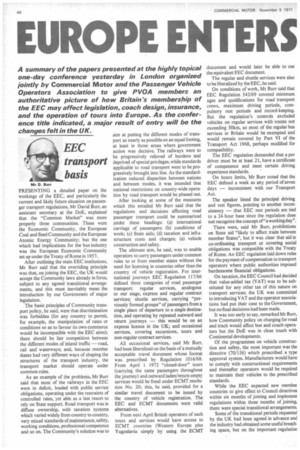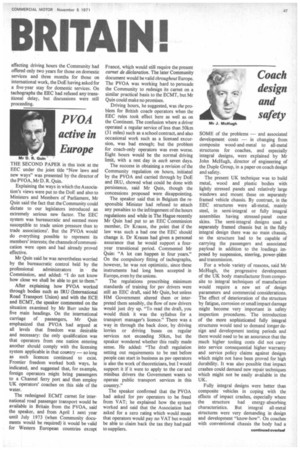EUROPE ENTERS BRITAIN!
Page 48

Page 49

If you've noticed an error in this article please click here to report it so we can fix it.
EEC transport basis
PRESENTING a detailed paper on the workings of the EEC, and particularly the current and likely future situation on passenger transport regulations, Mr David Burr, an assistant secretary at the DoE, explained that the "Common Market" was more properly three communities. These were the Economic Community, the European Coal and Steel Community and the European Atomic Energy Community; but the one which had implications for the bus industry was the European Economic Community set up under the Treaty of Rome in 1957.
After outlining the main EEC institutions, Mr Burr said that the overriding principle was that, on joining the EEC, the UK would accept the Community laws already in force, subject to any agreed transitional arrangements, and this must inevitably mean the introduction by our Government of major legislation.
The basic principles of Community transport policy, he said, were that discrimination was forbidden (for any country to permit, for example, the manipulation of rates or conditions so as to favour its own commerce would be incompatible with the EEC aims); there should be fair competition between the different modes of inland traffic — road, rail and waterways; and, because member Atates had very different ways of shaping the structures of the transport industry, the -transport market should operate under common rules.
As an example of the problems, Mr Burr said that most of the railways in the EEC were in deficit, loaded with public service obligations, operating under the restraints of controlled rates, yet able as a last resort to rely on State support. Road transport was in diffuse ownership, with taxation systems which varied widely from country to country, very mixed standards of maintenance, safety, working conditions, professional competence and so on. The Community's solution was to
aim at putting the different modes of transport as nearly as possible on an equal footing, at least in those areas where government action was decisive. The railways were to be progressively relieved of burdens and deprived of special privileges, while standards applicable to road transport were to be progressively brought into line. As the standardization reduced. disparities between nations and between modes, it was intended that national restrictions on country-wide operation by road transport would be phased out.
After looking at some of the measures which this entailed Mr Burr said that the regulations and decisions affecting road passenger transport could be summarized under these headings: (a) international carriage of passengers; (b) conditions of work; (c) State aids; (d) taxation and infrastructure costs and charges; (e) vehicle construction and safety.
The ultimate aim, he said, was to enable operators to carry passengers under common rules to or from member states without the need for licensing in countries other than the country of vehicle registration. For international journeys EEC Regulation 117/66 defined three categories of road passenger transport: regular services, analogous to our stage, express and regular contract services; shuttle services, carrying "previously formed groups" of passengers from a single place of departure to a single destination, and operating by repeated outward and return journeys — this would be on an express licence in the UK; and occasional services, covering excursions, tours and non-regular contract services.
All occasional services, said Mr Burr, had been liberalized on the basis of a mutually acceptable travel document whose format was prescribed by Regulation 1016/68. From April 1 1972 "closed-door" tours (carrying the same passengers throughout the journey) and outward laden/return empty services would be freed under ECMT resolution No. 20; this, he said, provided for a similar travel document to be issued by the country of vehicle registration. The EEC and ECMT documents were valid alternatives.
From next April British operators of such tours and services would have access to ECMT countries (Western Europe plus Yugoslavia simply by using the ECMT document and would later be able to use the equivalent EEC document.
The regular and shuttle services were also to be liberalized by the EEC, he said.
On conditions of work, Mr Burr said that EEC Regulation 543/69 covered minimum ages and qualifications for road transport crews, maximum driving periods, compulsory rest periods and record-keeping. But the regulation's controls excluded vehicles on regular services with 'routes not exceeding 50km, so most of the regular bus services in Britain would be exempted and would remain covered by Part VI of the Transport Act 1968, perhaps modified for compatibility.
The EEC regulation demanded that a psv driver must be at least 21, have a certificate of competence and meet certain driving experience standards.
On hours limits, Mr Burr noted that the EEC defined a week as any period of seven days — inconsistent with our Transport Act.
The speaker listed the principal driving and rest figures, pointing to another inconsistency — that EEC rest periods are tied to a 24-hour base since the regulation does not recognize the concept of" a working day".
There were, said Mr Burr, prohibitions on State aid "likely to affect trade between member States", but it was clear that aid in co-ordinating transport or covering social obligations was compatible with the Treaty of Rome. An EEC regulation laid down rules for the payment of compensation to transport operators where public authorities imposed burdensome financial obligations.
On taxation, the EEC Council had decided that value-added tax (VAT) was to be substituted for any other tax of this nature on transport services; the UK was committed to introducing VAT and the operator associations had put their case to the Government, but no final decisions had been made.
It was too early to say, remarked Mr Burr, how Community policy on charging for road and track would affect bus and coach operators but the DoE was in close touch with Continental developments, Of the programmes on vehicle construction and safety, the most important was the directive (70/156) which prescribed a type approval system. Manufacturers would have to comply with constructional requirements and thereafter operators would be required to maintain their vehicles to the prescribed standards.
While the EEC expected new member countries to give effect to Council directives within six months of joining and implement regulations within three months of joining, there were special transitional arrangements.
Some of the transitional periods requested by the UK had been agreed in advance and the industry had obtained some useful breathing space, but on the important regulation affecting driving hours the Community had offered only two years for those on domestic services and three months for those on international work, the DoE having asked for a five-year stay for domestic services. On tachographs the EEC had refused any transitional delay, but discussions were still proceeding.




































































































































































